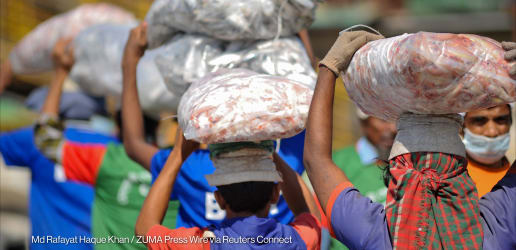
Catherine Davison
Latest Articles

Special edition: The global south demands a voice on AI at India summit
6 days ago // Devex Newswire
With artificial intelligence set to dramatically redefine global development, a key question dominated the India AI Impact Summit: Who holds the power to shape the future of AI?

How a global cold-chain revolution can boost food security
about 1 month ago // Food Systems
In a warming world with a growing population, the market for sustainable cooling in developing economies is set to double to $600 billion by 2050. Investors and governments are just starting to pay attention.

Can digital public infrastructure reshape donor-reliant health systems?
about 1 month ago // Technology
For years, digital health in Africa followed donor funding — often fragmented, short-term, and hard to sustain. Now, as aid contracts, countries are betting on digital public infrastructure to do things differently.

Ozempic generics are coming. But will low-income countries benefit?
3 months ago // Global Health
Analysts expect an 80% drop in prices once semaglutide goes generic. But experts warn that booming demand in wealthy countries may leave diabetes patients in low- and middle-income countries behind.

How digital public infrastructure has become a vital tool for development
5 months ago // Technology
Countries such as India and Brazil have pioneered a new approach to digital public infrastructure. With foreign aid shrinking, could it offer a more collaborative, cost-effective approach to development — and what are the risks?

If data is collected in communities, shouldn't it belong to communities?
5 months ago // Data and development
For years, data has been collected about the global south by governments, INGOs, and U.N. agencies. Communities haven't had power over what was collected, nor have they seen results of the research. Now, it's time for a change.

Air pollution gets ignored in UNGA noncommunicable disease declaration
5 months ago // UNGA 2025
Experts on air pollution raise alarms over the problem's absence from the upcoming declaration on noncommunicable diseases at the U.N. General Assembly.

Why a repressive regime's fall hasn't helped NGOs in Bangladesh
7 months ago // Democracy and governance
A year after its prime minister was ousted by a popular uprising, NGOs are disappointed in the country's lack of progress toward allowing them to do their work.

India-Pakistan conflict shows the need for better water agreements
9 months ago // WASH
Strains on the Indus Water Treaty highlight the increasing pressure on shared resource agreements from climate change and rising geopolitical competition.

WHO adopts new global strategy on traditional medicine
9 months ago // Global Health
WHO’s new strategy on traditional medicine seeks to bridge ancient healing practices with modern scientific standards — but not without controversy.